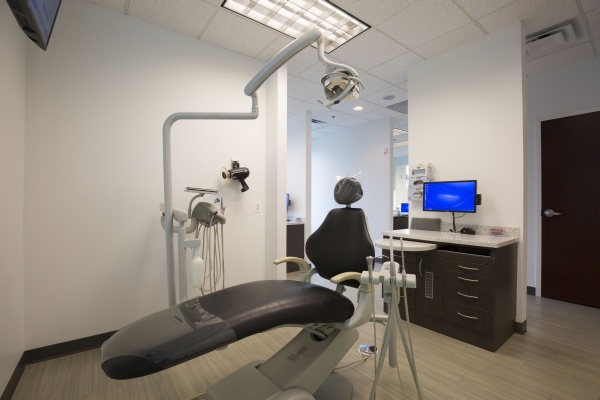The Stages of Gum Disease

Most adults experience some degree of gum disease during their lifetime, but it does not necessarily lead to tooth loss. Understanding how to identify and treat the stages of this common ailment can prevent it from spreading and reduce its impact.
What is gum disease?
Gum disease is an infection of the gum tissue surrounding the teeth. It starts with a build-up of bacteria that form a sticky substance called plaque over the teeth. The trapped food particles feed bacteria that migrate to the gums, eventually causing the following symptoms:
- Swelling and pain
- Redness and bleeding
- Loose teeth
- Persistent bad breath
- Foul taste in the mouth
- Change in bite
What are the stages of gum disease?
There are four stages of infection that a dentist can identify. The stage determines the treatment.
Gingivitis
The earliest manifestation of gum disease is gingivitis, characterized by bleeding gums and bad breath. Unless there is pain or discomfort, people often ignore these symptoms. Fortunately, gingivitis is reversible with professional dental cleanings and rigorous home care.
Early periodontitis
Swelling and bleeding during flossing are symptomatic of early-stage periodontitis. Bacteria cause gaps between the teeth and gums and begin to wear away at the supporting bone. This condition cannot be reversed, but it is possible to prevent further progression by increasing the frequency of deep dental cleanings and diligent home care efforts.
Moderate periodontitis
Painful gums that bleed or ooze pus indicate moderate periodontitis. Pockets between the teeth and gums deepen, and bone loss increases. Gums also begin to recede, exposing tooth surfaces that they usually cover. Cleaning and scaling are necessary to prevent bacteria from migrating to the bloodstream.
Advanced periodontitis
Pain, bleeding, and severe bone and tooth loss occur at this stage. Surgical intervention is necessary to remove bacteria from deep pockets. Patients have a much higher risk of systemic health problems caused by bacteria entering the bloodstream.
Who is at risk?
Gum disease generally increases with age, and it is relatively common among the elderly. Others who are especially susceptible include:
Anyone with an autoimmune disease
Autoimmune diseases can cause symptoms that manifest in the mouth and affect the teeth. For example, patients with Sjogren's syndrome cannot produce adequate saliva flow to wash away bacteria-breeding food particles. These patients may experience any stage of gum disease.
Anyone who smokes
Smoking can adversely affect the immune system, preventing it from combating oral bacteria. For this reason, the progression to late-stage periodontal disease can be rapid among smokers.
Women experiencing hormone changes
Hormonal changes at various life stages and pregnancy can cause increased blood flow to the gums, decreased saliva production, bone loss, and an inability to fight infection. The consequences range from reversible gingivitis to permanent tooth loss.
Anyone with poor oral hygiene
Most dentists advise their patients to brush at least twice per day and floss at least once per day. Individuals who fail to follow these guidelines are vulnerable to advanced gum disease from an accumulation of oral bacteria.
Conclusion
Regular dental check-ups and cleanings and diligent home care can identify early-stage gum disease and keep it from advancing. A healthy mouth can also prevent a wide range of unwanted complications throughout the body.
Request an appointment here: https://www.titandentalcare.com or call Titan Dental Care at (703) 745-3227 for an appointment in our Sterling office.
Check out what others are saying about our dental services on Yelp: Gum Disease in Sterling, VA.
Related Posts
Proper dental hygiene, including brushing, flossing, fluoride use, and regular dental examinations and cleanings, is necessary for more than just cosmetic reasons. One of the consequences of not taking good care of teeth and gums is gum disease, which is also called periodontal disease. There are three stages of this disease, and if it is…
When it comes to conditions that are damaging to the mouth, periodontal or gum disease is one of the most devastating. This infectious condition worsens over time, so a patient may not realize how serious it has become until damage to the soft tissues or jaw bone has already occurred. Periodontal disease will not go…
A dental checkup is essential for keeping the gums and teeth healthy. During the checkup, the dentist will examine the mouth, teeth, and gums for signs of diseases. The measures taken by dentists for gum disease is a patient’s first line of defense. In this article, you will discover how staying consistent with dental checkup…
Oral health issues like gum disease can make each day painful and uncomfortable. Call us for more info.Gum disease can spread throughout the mouth and damage multiple teeth in the process. Fortunately, it is entirely preventable with the proper oral hygiene and regular dental checkups. We can go over more at one such checkup.Gum DiseaseAt…


